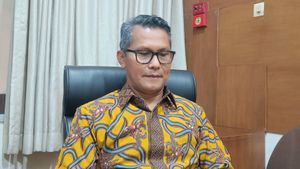JAKARTA The case of the death of Chinese badminton athlete, Zhang Zhijie, at a tournament in Yogyakarta has attracted the attention of the public. A cardiologist said the medical team's handling of Zhang Zhijie was too late.
In a video circulating on social media, Zhang Zhijie, 17 years old, fell and experienced convulsions in the match against Japanese athlete, Kazuma Kawamo, in the preliminary round of BNI Badminton Asia Junior Championships 2024 at GOR Amonggrogo, Yogyakarta, Sunday (30/6/2024).
Shortly after falling, the coach on the sidelines tried to help Zhang Zhijie but he could not do anything because of the ban from the referee, who followed the World Badminton Federation (BWF) regulations. It was only 40 seconds later Zhang received first aid because the medical team was waiting for permission from the referee.
Then it took 20 seconds for the medical team from the first time they entered the field to decide to take them to the hospital.
To note, Zhang's trip to the hospital was 4.7 km away and took 10 minutes. Only then did he undergo an external heart massage accompanied by a breathing apparatus because there was no spontaneous breath. Zhang was declared dead at night due to sudden cardiac arrest.
This case, especially regarding the delay in handling the medical team because it meets the rules, invites criticism on social media. A more important comment, a person's rule or life? On Chinese social media platform Weibo, thousands of people like it.
The case of a collapsing athlete in the field is not only experienced by Zhang Zhijie. Indonesian badminton legend, Markis Kido, died on June 14, 2021. Before he died, the Olympic gold winner was playing badminton with another athlete, Candra Wijaya, in the Tangerang area.
Candra told, Kido fell while moving after playing in half a set. Even though he was taken to the nearest hospital, Markis Kido's life could not be saved.
The same thing happened in other sports. In football, Antonio Puerta collapsed and was unconscious in the penalty area due to a heart attack while defending Sevilla against Getafe on August 25, 2007.
After receiving medical treatment and realizing it, Puerta walked into the dressing room, but she collapsed again. Puerta was rushed to the hospital and received resuscitation treatment from the doctor. He was pronounced dead on August 28 after being diagnosed with failure of many organs and permanent brain damage due to prolonged heart attacks.
But the incident that the public may remember the most is when Christian Eriksen suddenly fell in the Euro 2020 group stage match when Denmark hosted Finland at Parken Stadium, Copenhagen, June 12, 2021.
Two minutes before halftime, Eriksen collapsed in the field and had received pulmonary resuscitation (CPR) from medics by pumping the chest of the former Tottentan Hotspur player.
Eriksen was taken off the field consciously and rushed to the hospital. After undergoing treatment, Eriksen's condition gradually recovered and now he is still in Manchester United uniform.
According to a number of circles, the threat of health to the heart is very diverse and the risk is experienced by a number of people who have a history of heart disease.
But in an interview after a comeback to football, Eriksen said he and his family had no history of heart problems. And, like other top footballers, Eriksen's condition has always been checked throughout his career.
According to a heart specialist at Sebelas Maret University Hospital (UNS) Surakarta, Habibie Arifianto, said Eriksen was most likely suffering from a cardiac arrest or cardiac arrest. This occurs due to abnormal thickening of the heart muscle or the so-called hypertrophy cardiomyopathy in medical terms.
Not a heart attack. Hypertrophy cardiomyopathy is caused by a tissue bunch on the heart muscle, this causes the heart muscle to become very thick and risks experiencing rhythm disorders during excessive activity, in this case exercise, to be able to trigger sudden cardiac arrest," explained Habibie, quoted by the UNS page.
The risk of a heart attack for athletes is the same as the risk of a sudden heart attack or cardiac arrest in the general population. Especially for those who already have a risk factor ofcut heart disease or the risk of a family with sudden cardiac arrest," he said.
SEE ALSO:
Highlighting the case experienced by Zhang, Chairman of the Association of Indonesian Cardiovascular Specialist Doctors, dr. Radityo Prakoso SpJP (K) said basic life assistance to someone who is experiencing cardiac arrest is very important and can increase life opportunities.
Assistance can be done either with CPR or with an Automatic External Defibrillator (AED) tool.
"So with AED... he greatly increased survival in the first minute. But if nothing, by handing-onlyCPR, this can already be very, very helpful to bring back a collapsing patient," said Radityo.
Radityo emphasized the importance of providing basic life assistance immediately. Because if it is late, it has the potential to cause patients permanent damage to the brain without circulation.
"So if [the medical team] has seen cardiac arrest, he [Zhang] must be helped quickly. If you wait 40 seconds, the survival rate will go down. So it's too late," said Radityo.
Regarding the time it took to help Zhang Zhijie from the field to the hospital, according to Radityo, it was too slow.
"It must have been permanently repeated, it was too late. So the point is how to facilitate that the whole community must know basic life support or basic life support assistance," said Radityo.
This is our common homework in Indonesia. This is also a slap," said Radityo.
The English, Chinese, Japanese, Arabic, and French versions are automatically generated by the AI. So there may still be inaccuracies in translating, please always see Indonesian as our main language. (system supported by DigitalSiber.id)














